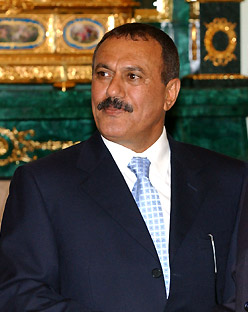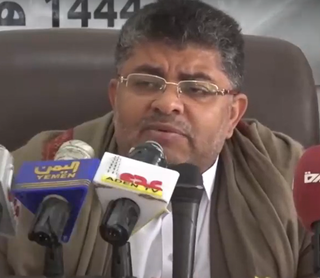Mohammad Sewar is a Yemeni politician. [1] He quit his position as Assistant Secretary General of the Cabinet over the 2011 Yemeni uprising.
Mohammad Sewar is a Yemeni politician. [1] He quit his position as Assistant Secretary General of the Cabinet over the 2011 Yemeni uprising.

The history of Yemen describes the cultures, events, and peoples of what is one of the oldest centers of civilization in the Near East. Its relatively fertile land and adequate rainfall in a moister climate helped sustain a stable population, a feature recognized by the ancient Greek geographer Ptolemy, who described Yemen as Eudaimon Arabia meaning "fortunate Arabia" or "Happy Arabia". Yemenis had developed the South Arabian alphabet by the 12th to 8th centuries BC, which explains why most historians date all of the ancient Yemeni kingdoms to that era.

The Politics of Yemen are in an uncertain state due to the Houthi takeover in Yemen. An armed group known as the Houthis or Ansar Allah seized control of the Northern Yemeni government and announced it would dissolve parliament, as well as install a "presidential council", "transitional national council", and "supreme revolutionary council" to govern the country for an interim period. However, the deposed president, Abdrabbuh Mansur Hadi, has declared he is still in office and is working to establish a rival government in Aden.

Ali Abdullah Saleh al-Ahmar was a Yemeni politician who served as the first President of Yemen, from Yemeni unification on 22 May 1990 to his resignation on 25 February 2012, following the Yemeni Revolution. Previously, he had served as President of the Yemen Arab Republic, or North Yemen, from July 1978 to 22 May 1990, after the assassination of President Ahmad al-Ghashmi.

Yemen, officially the Republic of Yemen, is a country in Western Asia. It is situated on the southern end of the Arabian Peninsula, and borders Saudi Arabia to the north and Oman to the northeast and shares maritime borders with Eritrea, Djibouti, and Somalia. Yemen is the second-largest Arab sovereign state in the peninsula, occupying 555,000 square kilometres, with a coastline stretching about 2,000 kilometres. Its constitutionally stated capital, and largest city, is Sanaa. As of 2021, Yemen has an estimated population of 30.4 million.
Sectarianism is a political or cultural conflict between two groups which are often related to the form of government which they live under. Prejudice, discrimination, or hatred can arise in these conflicts, depending on the political status quo and if one group holds more power within the government. Often, not all members of these groups are engaged in the conflict. But as tensions rise, political solutions require the participation of more people from either side within the country or polity where the conflict is happening. Common examples of these divisions are denominations of a religion, ethnic identity, class, or region for citizens of a state and factions of a political movement.

South Yemen (Arabic: اليمن الجنوبي, romanized: al-Yaman al-Janubiyy), officially the People's Democratic Republic of Yemen (جمهورية اليمن الديمقراطية الشعبية, Jumhūriyat al-Yaman al-Dīmuqrāṭīyah al-Sha'bīyah), also referred to as Democratic Yemen (اليمن الديمقراطي, al-Yaman al-Dīmuqrāṭīyy) or Yemen (Aden) (اليمن (عدن), al-Yaman ('Adin)), was a communist state that existed from 1967 to 1990 as a state in the Middle East in the southern and eastern provinces of the present-day Republic of Yemen, including the island of Socotra.

Yemeni unification took place on May 22, 1990, when the area of the People's Democratic Republic of Yemen was united with the Yemen Arab Republic, forming the Republic of Yemen.

The Yemeni Civil War was a civil war fought between the two Yemeni forces of the pro-union northern and the socialist separatist southern Yemeni states and their supporters. The war resulted in the defeat of the southern armed forces, the reunification of Yemen, and the flight into exile of many Yemeni Socialist Party (YSP) leaders and other separatists.

The Houthi movement, officially called Ansar Allah and colloquially simply Houthis, is an Islamist political and armed movement that emerged from Saada Governorate in North Yemen in the 1990s. The Houthi movement is a predominately Zaidi Shia force, whose leadership is drawn largely from the Houthi tribe.

The Imams of Yemen, later also titled the Kings of Yemen, were religiously consecrated leaders belonging to the Zaidiyyah branch of Shia Islam. They established a blend of religious and temporal-political rule in parts of Yemen from 897. Their imamate endured under varying circumstances until the end of the North Yemen Civil War in 1970, following the republican revolution in 1962. Zaidiyyah theology differed from Isma'ilism or Twelver Shi’ism by stressing the presence of an active and visible imam as leader. The imam was expected to be knowledgeable in religious scholarship, and to prove himself a worthy headman of the community, even in battle if this was necessary. A claimant of the imamate would proclaim a "call" (dawah), and there were not infrequently more than one claimant.

The Southern Movement, sometimes known as the Southern Separatist Movement, or South Yemen Movement, or Aden Movement, and colloquially known as al-Hirak, is a political movement and paramilitary organization active in the south of Yemen since 2007, demanding secession from the Republic of Yemen and a return to the former independent state of South Yemen. At present, its best-known political offshoot, the Southern Transitional Council led by Aidarus al-Zoubaidi, is the de facto leadership across many provinces of the south.

Abdrabbuh Mansur Hadi is a Yemeni politician and former field marshal of the Yemeni Armed Forces who served as the president of Yemen from 2012 until 2022, when he stepped down and transferred executive authority to the Presidential Leadership Council, with Rashad al-Alimi as its chairman. He was the vice president to Ali Abdullah Saleh from 1994 to 2012.

The Yemeni Congregation for Reform, frequently called al-Islah, is a Yemeni Islamist party founded in 1990 by Abdullah ibn Husayn al-Ahmar, Ali Mohsen al-Ahmar, Abdul Majeed al-Zindani, with Ali Saleh's blessing. The first article of Islah basic law defines it as "a popular political organization that seeks reform of all aspects of life on the basis of Islamic principles and teachings".

The Cabinet of Yemen refers to the governing body of the internationally recognized Yemen government led by the Chairman of the Presidential Leadership Council Rashad al-Alimi who replaced former President of Yemen Abdrabbuh Mansur Hadi on 7 April 2022 as the new President of Yemen. He then selected new cabinet members of the Yemeni Government.
Yemeni hip hop is a Yemeni music style and cultural movement related to rap and hip hop culture. It has influences from American hip hop and also from traditional music from the region. It is usually considered to have emerged from mid-2000s and reached its consolidation by 2009 when the first public concert was held in the French Cultural Institute. Although it has a variety of themes, there was an intense production of political songs by the Yemeni Revolution.
Yemeni Americans are Americans of Yemeni ancestry. According to an estimate of 2010, more than 100,000 Yemenis live in the United States.

The Houthi takeover in Yemen, also known as the September 21 Revolution, or 2014–15 coup d'état, was a popular revolution against Yemeni President Abdrabbuh Mansur Hadi led by the Houthis and their supporters that pushed the Yemeni government from power. It had origins in Houthi-led protests that began the previous month, and escalated when the Houthis stormed the Yemeni capital Sanaa on 21 September 2014, causing the resignation of Prime Minister Mohammed Basindawa, and later the resignation of President Abdrabbuh Mansur Hadi and his ministers on 22 January 2015 after Houthi forces seized the presidential palace, residence, and key military installations, and the formation of a ruling council by Houthi militants on 6 February 2015.

Mohammed Ali al-Houthi is a Yemeni political figure who is the former President of the Revolutionary Committee or Revolutionary Council, a body formed by Houthi militants and the de facto President of Yemen. He was one of the military field commanders who led the group's seizure of the Yemeni capital Sana’a in September 2014, and eventually became the de facto leader of Yemen after the Houthi takeover of the Yemeni government in 2015. He is a cousin of Abdul-Malik Badreddin al-Houthi, the group's leader.

The Yemeni Crisis began with the 2011–2012 revolution against President Abdullah Saleh, who had led Yemen for 33 years. After Saleh left office in early 2012 as part of a mediated agreement between the Yemeni government and opposition groups, the government led by Saleh's former vice president, Abdrabbuh Mansur Hadi, struggled to unite the fractious political landscape of the country and fend off threats both from Al-Qaeda in the Arabian Peninsula and from Houthi militants that had been waging a protracted insurgency in the north for years.

On 26 March 2015, Saudi Arabia, leading a coalition of nine countries from West Asia and North Africa, launched an intervention in the Yemeni Civil War in response to calls from the president of Yemen Abdrabbuh Mansur Hadi for military support after he was ousted by the Houthi movement. The conflict ignited between the government forces, the Houthi rebels and other armed groups after the draft constitution and power-sharing arrangements collapsed, despite progress in the political transition led by the United Nations at that time, leading to an escalation of violence in mid-2014. The Houthis and allied units of the armed forces seized control of Sana’a and other parts of the country in September 2014 and in the following months. This prompted President Hadi to ask Saudi Arabia to intervene against the Iranian-backed Houthis.